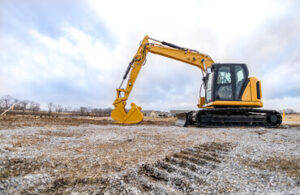Overgrown brush and debris can block off access to a property. Land clearing removes these obstacles and makes the area safer for vehicles, equipment, and pedestrians.

Sustainable Land Clearing Thorndale TX methods preserve habitats for local wildlife and promote biodiversity. This also helps cultivate healthy levels of soil nutrients and reduces greenhouse gases.
Whether you are trying to expand your agricultural operation, build a home or set up a new commercial facility, land clearing offers several advantages. By removing trees, shrubs and debris from a site, professionals can lay the groundwork for construction projects by creating an even and stable surface. In addition, clearing allows for more usable space and increases the value of your property by boosting curb appeal. Cleared land can also be used to address invasive plants and pests, ensuring that the desired vegetation thrives while eradicating undesirable species.
Another significant benefit of land clearing is its safety benefits. Overgrown plots of land can harbor pests and pose fire hazards, especially in dry climates. In addition, dense foliage can block access to various parts of a property, resulting in costly delays or injuries during construction and other activities. Professionals prioritize safety during clearing operations by adhering to regulatory standards, utilizing specialized machinery and implementing proper risk management strategies.
In addition, a thorough site inspection is conducted to determine the type and extent of vegetation that needs removal. Then, a detailed plan is created that addresses the type of work to be performed. The work itself may involve manual clearance (using hand tools), mechanical clearing (using heavy machinery like bulldozers and excavators) or chemical clearing, which uses herbicides to kill unwanted vegetation.
During the clearing process, the weather is carefully monitored to ensure optimal conditions for safe and efficient operations. Dry conditions decrease the risk of equipment getting stuck in mud and improve visibility, which reduces accidents and injuries. In addition, clear skies and drier weather allow for better air quality and prevent valuable topsoil from being washed away.
Improved Appearance
Whether you are planning on selling your property, making a business expansion, or just want to increase the overall aesthetic of your land, clearing away debris and overgrowth can significantly improve its appearance. Professional Land Clearing services remove unwanted plants, trees, and shrubs, leaving your property looking clean, open, and inviting to potential buyers or clients.
Besides enhancing the aesthetic of your property, professional Land Clearing also has environmental benefits when done correctly. Removing invasive species and overgrown vegetation can promote healthier ecosystems for native plants, animals, and biodiversity. This process also prevents soil erosion and protects water quality.
Dense brush, dead trees, and accumulated debris can become fire hazards in dry climates. Land clearing reduces this combustible material, helping to save homes and businesses from devastating wildfires. It also helps to reduce airborne diseases like fungi, insects, and viruses.
Land clearing is a vital step in various construction and development projects. It prepares the land for foundations, roads, and utilities, saving time and money during the building process. It can also help identify any potential obstacles or challenges that need to be addressed before the project begins.
The most obvious reason to invest in land clearing is that it increases the value of your property. A poorly maintained lawn or an empty lot full of overgrowth and trash is a turnoff for any prospective buyer. Land clearing makes your property look well-maintained and professional, increasing its value and curb appeal. Moreover, the services can eliminate the need for frequent landscaping and yard maintenance, which saves you money in the long run. This is a great investment for any home or commercial owner.
Increased Plant Growth
In overcrowded areas, plants compete for access to water and nutrients in the soil. Land clearing services help reduce overgrowth and remove weeds to give your flora more room and the ability to absorb vital nutrients that boost growth.
When left unattended, overgrown vegetation provides breeding grounds for mosquitos, gnats, and other pests that can carry diseases such as Lyme’s Disease. In addition, dead tree limbs and overgrown shrubbery provide shelter for wildlife that can cause property damage and pose serious safety risks for people living nearby. Land clearing services get rid of unwanted vegetation and animals to keep them away from your property, protecting both you and your family’s health and safety.
Another reason why land clearing is necessary is for agricultural purposes, such as preparing a field for planting or creating pastures for livestock. Land clearing allows farmers to maximize crop production by expanding the cultivable area, managing plant pests and diseases, improving soil quality, and ensuring proper drainage.
Land clearing also helps to improve air quality by reducing the amount of allergens and pollutants in the environment. This is important for families with allergies and those suffering from respiratory conditions like asthma. Land clearing can also help improve water quality by reducing runoff and nutrient pollution in lakes and streams.
Land clearing also helps to preserve ecosystems by removing invasive species that threaten native plant and animal populations. In addition, many land clearing companies utilize sustainable practices that include vegetative buffer zones, which reduce soil erosion and provide habitats for wildlife. Incorporating these strategies into your land clearing project will make a positive impact on the environment while still allowing for future land uses and maintaining the integrity of the surrounding ecosystems.
Reduced Pest Populations
Overgrown areas of trees and plants can harbor pests like rodents, snakes, insects, and mosquitoes. They can also conceal hazards such as uneven ground or fallen debris. Clearing the land eliminates these risks and makes the property safer for everyone who uses it, including animals and people.
Overgrowth also increases the risk of wildfire, especially in dry seasons. The tinder-dry material in dense vegetation and dead limbs is an ideal fire hazard, and can quickly spread to nearby homes or buildings. Land clearing prevents these fire hazards, and it can be done using various methods that don’t cause harm to the environment.
Sustainable land clearing practices conserve biodiversity, promote soil health, reduce greenhouse gas emissions, and improve air quality. They also help protect water conservation and reduce the risk of floods and droughts.
Choosing the right clearing method is essential for the success of the project and its long-term impact on the soil. There are many options available, ranging from manual hand clearing to mechanical machinery and controlled burning. The right choice will depend on the size of the area and type of vegetation present. It’s important to choose a method that doesn’t damage the surrounding ecosystem, and avoid using chemicals that may be harmful to wildlife or humans.
The best way to ensure that a clearing project is sustainable is to hire professionals who specialize in it. They will be able to assess the project site and determine the appropriate clearing method, and use techniques that minimize the impact on the soil and nearby vegetation. This will ensure that the cleared land can be used for sustainable practices such as reforestation, sustainable agriculture, or green infrastructure projects.
Reduced Soil Erosion
Using the right land clearing techniques, you can preserve the health and vitality of your soil. While traditional methods such as axes and machetes can be time-consuming and labor-intensive, eco-friendly land clearing options like forestry mulching offer precision, efficiency, and safety while minimizing ecological disturbances. These practices also enable your land to absorb and retain more nutrients, which is essential for promoting healthy plants and trees.
Overgrown vegetation can promote weed growth, which leads to soil erosion. As the weeds grow, they compete for sunlight and water resources, which can deprive your plants and crops of the nutrients they need to thrive. In addition, rotting tree stumps and other debris can foster insect infestations, creating pest problems in the future. Land clearing helps to eliminate these issues and prevent soil erosion, leaving you with a healthier plot of land that is better for building homes, farming, or setting up businesses.
For construction projects, cleared land provides a blank canvas and makes it easier for contractors to work around obstacles and complete the project on schedule. It also improves the overall safety of the construction site by reducing fire hazards and providing a clear line of sight.
Whether you’re looking to boost your property’s curb appeal or want to make a lasting impression on visitors and clients, a well-maintained lot with an organized appearance is essential. Land clearing can help you achieve these goals by removing overgrowth and dead trees, making your land look attractive and inviting. Additionally, it can increase your property value by making it more attractive to potential buyers and investors.








